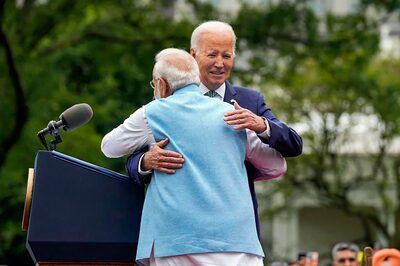
views
Naveen Jindal is a fighter. He is used to winning. When a case was filed against him for flying the National Flag atop the headquarters of his company, Jindal Steel and Power Ltd. (JSPL), he took the matter all the way to the Supreme Court and won the right to do so. Thanks to him, Indian citizens can fly the National Flag in homes and offices. In 2004, contesting his first Parliamentary elections, Jindal defeated the son of the sitting chief minister of Haryana by over a lakh-and-a-half votes.
However, the Congress Party Member of Parliament finds himself faced with a different fight today — one that he has been trying to win for the past 12 years. His adversaries: Indian Railways and Steel Authority of India (SAIL).
Since 1998, he has been trying to get a piece of the Rs. 4,000 crore railway line contract that the Railways needs every year to lay new tracks and replace old ones across the country. He even spent Rs. 1,000 crore to set up a mill at his Chhattisgarh steel plant exclusively to make these rails. But the mill, which has an annual capacity of 750,000 tonnes of rail steel, has been lying almost idle since 2003. Because every year the order goes to SAIL.
This is not what Jindal had anticipated when he set up the plant in 2000. In 1998, the Railways came out with an advertisement, "inviting entrepreneurs to set up facilities for manufacture of rails." JSPL claims it set up the plant on an "understanding" with the Railways that the contracts to supply tracks would be open for competition. Now it claims the Railways backtracked on that promise.
It is not clear how far this is true. Indian Railways refused to comment on queries from Forbes India. But what is clear is that SAIL cannot fulfil the 1,000 km worth of tracks that India plans to lay every year. The current rate of execution is slow. Indian Railways lays only 230 km of tracks a year. But as it steps up the rate of expansion, SAIL alone cannot meet the need. JSPL claims its capacity can reduce the shortfall.
Jindal's case is considerably weakened by the fact that he doesn't have a signed agreement with the Railways. "If he had a document to show, Railways might have been forced to act," says a source close to the government department. A close associate of Jindal's also admits that "those at JSPL were indeed a little naïve for not insisting on an agreement."
The only orders for the mill have been from a few private companies who want to lay railway tracks to connect their plants and sheds. "Even today, just about 30 per cent of the capacity is being used at the mill. Its viability is solely dependent on Indian Railways' orders," says the associate, who refused to comment further on the matter as it is now with the Competition Commission of India (CCI) since December 2009.
A battle with no end
For Jindal, a 28-year-old in 1998, having Indian Railways as a client would have been a godsend. It was a possible source of consistent revenue for his company that was yet to cross Rs. 500 crore in annual revenues. After making presentations to the Railway Board, JSPL claims that the government department asked the company to "go ahead".
Jindal acquired a rail and structural mill in South Africa and installed it at Chhattisgarh in 2000. But by the end of 2001, Railways did "a U-turn and wrote to JSPL that it will procure the rails from SAIL, which has committed to meet Railways requirement of long rails," says Jindal's associate.
The requirement — which Railways claimed was recommended by the Justice Garg Committee that inquired into a train accident in 1998 due to faulty rails — was to use RH degasser technology for stronger rails; JSPL used tank degassing technology. In 2003, the Railways signed an exclusive agreement with SAIL.
Jindal got working on his political and corporate networks. Petitions supporting his case were signed by other Members of Parliament. Letters from industry bodies like Confederation of Indian Industries were sent to the Railway ministry. Jindal got a shot in the arm when the Right To Information Act was used to access a confidential document, which revealed that Justice Garg had "not made any recommendation on behalf of any technology. In fact, he had submitted his report in 2004, two years after Railways quoted the committee to rule in favour of SAIL," says the Jindal associate.
Railways' Research Designs and Standards Organisation (RDSO) inspected JSPL's rail mill in 2005 and later in 2008 approved it. "The company installed the RH degasser technology at its mill just to make sure all ends are taken care of," says a source close to JSPL. While Indian Railways officials couldn't be reached and a questionnaire to SAIL remained unanswered, industry officials reckon "there is enough room for two players to supply rails for Railways. Already the controversy has seen SAIL upgrading its facility in Bhilai and JSPL has offered to sell rails at 10 per cent lower price which can save Railways up to Rs. 400 crore annually."
Jindal alone is not waiting for CCI's verdict; the rest of the steel industry will also have its ears open. Legal expert Akil Hirani of Majmudar & Co says, "CCI is empowered to inquire into complaints regarding anti-competitive agreements and alleged abuse of dominant position."
"Over 70 per cent of the construction expenditure in the country is done by the government. And half of the steel made in India is used for construction activities. Though things have improved a little, it is still tough for private companies, especially the smaller ones, to get government contracts," says Jitendra Singh, industry veteran and a member of the All Indian Induction Furnace Association. Earlier this month, the Association had its own little victory when the government removed a clause that prevented smaller private steelmakers from bidding for orders.
Banking on market forces
The CCI could force Indian Railways and SAIL to change track. The exclusive agreement between Railways and SAIL "does look like an entry barrier for other players and thus is against the provisions of the Competition Act," said an industry expert on the condition of anonymity. Indeed, Jindal's biggest hope rests on the principles of market economy that the industrialist first propagated to drive his case. While he was asking for "fair competition" and "level playing field" to decide the best supplier, now it might be "demand and supply economics" that could help him. The Railway minister's latest budget calls for laying over 1,000 km of new tracks within the next year, against the average of 230 km annually that was accomplished in the last five years. Even if the ministry achieves half the target, it will call for a drastic increase in the supply of rails.
And Jindal will take heart because the law of demand and supply has helped open up another critical sector of power manufacturing equipments. "From late last year, the government has done away with the 15 per cent price preference that state-owned companies used to get while bidding for government projects. One of the main reasons was that increasing demand outstripped the local capacity and was forcing government to resort to imports," says Sujit Ghosh of BMR Advisors.
The price preference policy means that a state-owned company would get the orders even if its bid was up to 15 per cent higher than a private company's. As a result, state-owned companies would be loaded with orders leading to delays and sometimes even compromise in quality. "Till the 1990s, it used to take up to 24 months to complete a project due to this reason. Now with private companies getting par treatment, the same project is completed in half the time," says P.R. Chandna, an industry consultant. Officials at engineering major Larsen & Toubro note that "unlike earlier when BHEL was the preferred vendor for almost all government orders, things are changing now. Of late, we have bagged many such projects."
Jindal would be hoping for a similar change in the steel sector. "While the price preference policy is almost absent in steel sector, purchase preference is still on. Under this, if everything remains the same — such as price and quality — then the contract goes to the public sector company. But yes, in some cases there are some tacit understandings between two state-owned companies or between the government and a public sector unit," notes a senior official at one of the largest private steel companies in the country, who requested anonymity.
JSPL is today a Rs. 7,600 crore company. If Jindal has his way he will have come a long way from the naïve 28-year-old that he was in 1998.



















Comments
0 comment